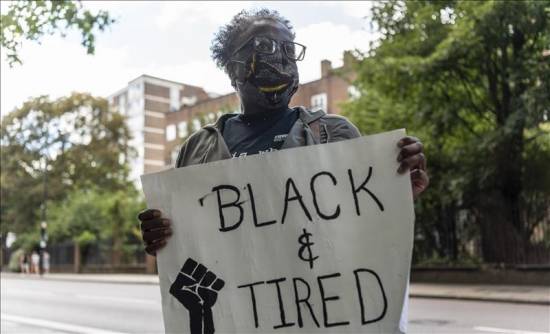Nearly a third of Black Californians reported being treated unfairly in the health care system because of their race, according to a report from the California Health Care Foundation.
The big picture: The research — which also found more than 1 in 4 Black Californians avoided getting medical care due to worries about unfair or disrespectful treatment — shows the impact of racial disparities in the most highly populated state in the country.
- The findings stem from a survey released Tuesday of more than 3,300 Black Californian adults and interviews with 100 Black people statewide by the California Health Care Foundation and EVITARUS, a Black-owned research firm.
What they found:
- The percentage who reported disparate treatment based on race increases if they identify as LGBTQ, a woman or have a mental health condition or physical disability.
- An overwhelming majority said they put extensive effort into getting preventive care, tracking their blood pressure and cholesterol and have seen a doctor in the past year.
- Meanwhile, more than 80% of respondents who said they have been treated poorly due to their race told researchers they prepare for future health visits to minimize negative experiences.
- More than 60% tell providers they're educated or adjust how they speak "to make the provider feel more at ease."
Tracy Edwards, a 55-year-old man who was part of the study told Axios that doctors have assumed he has a high pain tolerance and denied him medication in the ER.
- "The doctor was like 'Come on, you're Black. You can take it. You're tough,'" Edwards recalled. "I'm here in the emergency room because I'm in pain. Don't assume. You don't know me."
- He said another provider refused to believe he didn't do illegal drugs or heavily drink.
- "Everybody that you interact with ... there should be some training that they undergo so they don’t start making these assumptions," Edwards said. "Just use your medical knowledge on the patient. Don't use anything else."
Of note: Respondents suggested the barriers to good health outcomes went beyond how they're treated in health systems.
- Some pointed to poor air quality, unsafe drinking water and high levels of crime that affect the ability to exercise outside.
- Others reported lacking recreational areas or grocery stores that sold fresh food.
The bottom line: "It's important for stakeholders and decision makers to hear those calls and those priorities and make the investments" to improve the quality of health care for Black patients, said Shakari Byerly, principal researcher at EVITARUS./ axios


